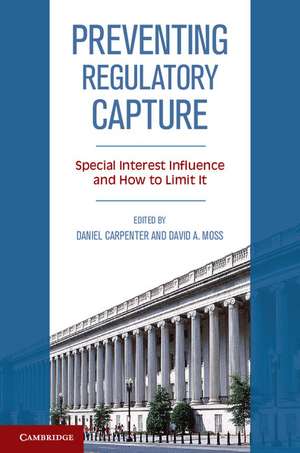Preventing Regulatory Capture: Special Interest Influence and How to Limit it
Editat de Daniel Carpenter, David A. Mossen Limba Engleză Paperback – 20 oct 2013
| Toate formatele și edițiile | Preț | Express |
|---|---|---|
| Paperback (1) | 280.63 lei 6-8 săpt. | |
| Cambridge University Press – 20 oct 2013 | 280.63 lei 6-8 săpt. | |
| Hardback (1) | 516.42 lei 6-8 săpt. | |
| Cambridge University Press – 20 oct 2013 | 516.42 lei 6-8 săpt. |
Preț: 280.63 lei
Nou
Puncte Express: 421
Preț estimativ în valută:
53.71€ • 55.86$ • 44.34£
53.71€ • 55.86$ • 44.34£
Carte tipărită la comandă
Livrare economică 15-29 aprilie
Preluare comenzi: 021 569.72.76
Specificații
ISBN-13: 9781107646704
ISBN-10: 1107646707
Pagini: 530
Ilustrații: 18 b/w illus. 23 tables
Dimensiuni: 150 x 226 x 33 mm
Greutate: 0.7 kg
Ediția:New.
Editura: Cambridge University Press
Colecția Cambridge University Press
Locul publicării:New York, United States
ISBN-10: 1107646707
Pagini: 530
Ilustrații: 18 b/w illus. 23 tables
Dimensiuni: 150 x 226 x 33 mm
Greutate: 0.7 kg
Ediția:New.
Editura: Cambridge University Press
Colecția Cambridge University Press
Locul publicării:New York, United States
Cuprins
Introduction Daniel Carpenter and David Moss; Part I. Failures of Capture Scholarship: 1. A revisionist history of regulatory capture William Novak; 2. The concept of regulatory capture: a short, inglorious history Richard Posner; 3. Detecting and measuring capture Daniel Carpenter; Part II. New Conceptions of Capture - Mechanisms and Outcomes: 4. Cultural capture and the financial crisis James Kwak; 5. Complexity, capacity, and capture Nolan McCarty; 6. Preventing economists' capture Luigi Zingales; 7. Corrosive capture? The dueling forces of autonomy and industry influence in FDA pharmaceutical regulation Daniel Carpenter; Part III. Misdiagnosing Capture and Case Studies of Regulatory Success: 8. Capturing history: the case of the Federal Radio Commission in 1927 David Moss and Jonathan Lackow; 9. Conditional forbearance as an alternative to capture: evidence from coal mine safety regulation Sanford Gordon and Catherine Hafer; 10. Captured by disaster? Reinterpreting regulatory behavior in the shadow of the Gulf oil spill Christopher Carrigan; 11. Reconsidering agency capture during regulatory policymaking Susan Webb Yackee; 12. Coalitions, autonomy, and regulatory bargains in public health law Mariano-Florentino Cuéllar; Part IV. The Possibility of Preventing Capture: 13. Preventing capture through consumer empowerment programs: some evidence from insurance regulation Daniel Schwarcz; 14. Courts and regulatory capture M. Elizabeth Magill; 15. Can executive review help prevent capture? Richard Revesz and Michael Livermore; Conclusion David Moss and Daniel Carpenter; Afterword Sheldon Whitehouse and Jim Leach.
Recenzii
“This collection deftly sharpens our thinking about the nature of regulatory capture. It compiles the most multidimensional treatment we have of capture and the American regulatory state.” – John Braithwaite, Australian National University
“This is an enormously useful collection that goes beyond alleging and lamenting regulatory capture to provide diagnostic tools for evaluating purported instances of captured regulatory regimes and institutional techniques for avoiding their emergence and mitigating their effects.” – Jerry Mashaw, Yale University
“’Regulatory capture’ is an often used, little understood term. It is quoted frequently by those who would like to question a regulation for any of a number of agendas without an effort to understand the science or reason behind it. Daniel Carpenter, David Moss, and the co-authors have written a long overdue analysis of the issue and what, when proven true, can be done about it. – Christine Todd Whitman, former governor of New Jersey and former administrator of the Environmental Protection Agency
“This is an enormously useful collection that goes beyond alleging and lamenting regulatory capture to provide diagnostic tools for evaluating purported instances of captured regulatory regimes and institutional techniques for avoiding their emergence and mitigating their effects.” – Jerry Mashaw, Yale University
“’Regulatory capture’ is an often used, little understood term. It is quoted frequently by those who would like to question a regulation for any of a number of agendas without an effort to understand the science or reason behind it. Daniel Carpenter, David Moss, and the co-authors have written a long overdue analysis of the issue and what, when proven true, can be done about it. – Christine Todd Whitman, former governor of New Jersey and former administrator of the Environmental Protection Agency
Descriere
Leading scholars from across the social sciences present empirical evidence that the obstacle of regulatory capture is more surmountable than previously thought.















